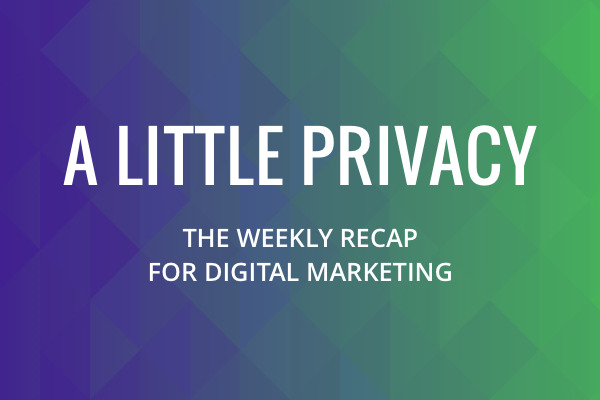Blog
A Little Privacy: week of August 2
August 9, 2021

–
Want to receive these weekly privacy recaps in your inbox? Sign up for our privacy newsletter, A Little Privacy.
USA
Facebook disables accounts of university researchers
In response to a report that Facebook disabled the personal accounts of New York University researchers who were collecting data on the targeting of political ads on Facebook, Sen. Mark Warner (D-VA) released a statement calling Facebook’s decision “deeply concerning” and stating that “it’s time for Congress to act to bring greater transparency to the shadowy world of online advertising, which continues to be a major vector for fraud and misconduct.”
OUR TAKE
Although Sen. Warner is just one senator, we have seen a rapidly increased emphasis in the United States on addressing privacy, antitrust, fraud and misconduct in the advertising industry, in particular surrounding the collection and use of data for ad targeting. This is just another signal that we’re likely to see an increase in legislation, regulation and enforcement in these areas.
Europe
Amazon threatened with unprecedented GDPR fine
According to new information released this week, Amazon has 6 months to establish a proper legal basis for its ad targeting practices to avoid receiving a 746 million euro fine per day of delay after the 6-month period. The decision was issued by the Luxembourg data protection authority and agreed to by other European states.
Amazon had previously relied on its contract terms of service as a means of obtaining consent to ad targeting, which the Luxembourg DPA held to be insufficient.
Some context: Amazon is not the first company to try to rely on its Terms of Service as a legal basis to process data for ad targeting, either leaning on it as a form of consent under Article 6.1(a) or claiming that ad targeting is “necessary for the performance of a contract” under Article 6.1(b) Article 6.1(b) only applies if processing is necessary for the performance of a contract, and, despite arguments from Facebook and Amazon, the courts don’t appear to consider targeted advertising to be “necessary” to the services they provide consumers.
OUR TAKE
Identity solutions that rely on first-party data may tempt data controllers to combine consent with other contract terms (e.g., agreeing to the terms of service). These cases are good reminders to always ensure consent is distinguishable, clear, and freely given.
IAB provides contextual advertising guidance
IAB Europe released a Guide to Contextual Advertising, noting that $412B is projected to be spent on contextual advertising by 2025. The guide provides best practices, including using providers who have access to opt-in panels and checking up on the transparency of providers through A/B testing on the accuracy and precision of their classification. The guide also discusses the integration of first-party data with contextual advertising, offering that “incorporating real-time insight into a contextual campaign ensures the perfect blend between audience and context is achieved.”
OUR TAKE
Shifts to contextual targeting may present new challenges for publishers and advertisers to ensure the providers and methods selected are transparent, effective and responsible. Additionally, an emphasis on opt-in panels and first-party data to supplement contextual advertising will depend on consent solutions that are tailored to the needs of the evolving digital advertising industry.
GLOBaL
Brazil’s LGPD goes into effect
The final portion of the LGPD went into effect on August 1, authorizing administrative sanctions for noncompliance. The Brazil data protection authority, however, pledged to take a responsive approach to organizations failing to comply, as reported by ZDNet.
OUR TAKE
Now that sanctions are a possibility, we may start to see companies taking LGPD more seriously, although the “responsive approach” promised by the DPA may calm anxieties.
Israel DPIAs
The Israel Authority for Conducting an Impact on Privacy Survey released a new guide to help companies identify and reduce risks from collection of personal data. The public comment period is now open to receive feedback on the guidelines.
OUR TAKE
Although Israel law doesn’t currently require data protection impact assessments, this is another example of the growing emphasis from countries across the globe either mandating or encouraging companies to incorporate such assessments into projects involving personal data.
Pseudonymous data use in South Korea
South Korea’s Personal Information Protection Commission issued proposed amendments to the Notice on the Combination and Export of Pseudonymous Information, providing clarity on the pseudonymization, export and combination of data, in order to promote the safe and convenient dissemination of pseudonymous information. The Commission opened a 20-day public comment period to provide feedback.
OUR TAKE
Due to the pseudonymous nature of most advertising data (i.e., not directly identifying an individual without combining with other data), changes to requirements and guidelines regarding the handling of pseudonymous information are likely to impact the advertising industry, but we will know more from analysts in the coming weeks.
Want more of the privacy highlights that matter to adtech and martech? Sign up for our privacy newsletter, A Little Privacy.
Latest Blog Posts
Multi-State Privacy Investigation Targets GPC Compliance While California Pushes “Opt Me Out Act”
September 15, 2025California, Colorado, and Connecticut launch joint GPC compliance investigation...
FTC Targets Disney and Apitor in Latest Children’s Privacy Enforcement Actions
September 9, 2025Minnesota becomes the 16th state with comprehensive privacy legislation...
9th Circuit Ruling and Failed CIPA Reform Open One Door and Shut Another Signal for Privacy Class Action Reprieve
September 9, 20259th Circuit upholds website consent design while California's failed...
Latest White Papers
Connecting Legal & Marketing Teams on Consent and Preferences
February 4, 2025Break down data silos and unlock better collaboration. Marketing...
Navigating Sensitive Data in the U.S.
February 4, 2025Download our comprehensive guide to learn how different states...
Enterprise Guide To Cookie management & Tracker List Curation
July 1, 2024How to review the tracking tech on your websites...
Keep in touch
Sign up for our newsletter to keep up with privacy news for adtech and martech,
plus occasional company news.
